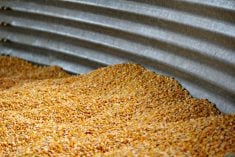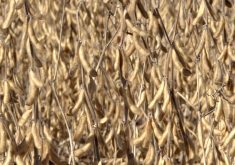Workers now on strike at three PotashCorp mines in Saskatchewan will vote on a tentative deal on Nov. 13, the potash company said Friday.
About 500 unionized workers at the Saskatoon company’s Allan, Cory and Patience Lake potash mines near Saskatoon have been on strike since Aug. 7. The workers handle underground mining as well as above-ground milling and shipping operations.
Managerial staff from the three mines restarted production at the Allan facility on a limited basis on Aug. 25.
The Allan, Cory and Patience Lake workers are members of the United Steelworkers (USW) locals 7689, 7458 and 189 respectively.
Read Also

Alberta Crop Report: Harvest reaches completion
Alberta’s harvest is virtually complete at 99.4 per cent finished, ahead of the five-year and 10-year averages at this time of the season.
It’s not yet known whether the agreement will have any effect on the USW pressing charges of unfair labour practices and bad-faith bargaining under Saskatchewan labour law over a letter sent directly from PotashCorp to individual strikers.
The company and union have also remained far apart over the USW’s rejected proposal for a profit-sharing bonus plan. The company last month posted third-quarter fiscal results with more profit earned in the quarter ($1.2 billion) than the company had netted in all of 2007 ($1.1 billion).
USW, for its part, remains mum about what the new tentative deal contains. It said in a separate statement Friday that no details of the agreement will be released until members of the three USW locals have a chance to review and vote on the package.
In discussing its Q3 ledger last month, PotashCorp pointed to “hisorically low” inventory levels among potash producers generally, including its own record-low stocks of 212,000 tonnes at the end of Q3.
PotashCorp said last month that the reduced supplies spawned by the strikes at its three mines (as well as by seasonal maintenance turnarounds at all potash producers) left potash fundamentals strong throughout the quarter.















